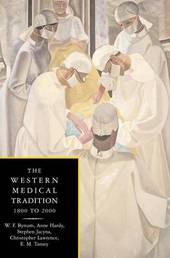
|
The Western Medical Tradition: 1800-2000
Hardback
Main Details
| Title |
The Western Medical Tradition: 1800-2000
|
| Authors and Contributors |
By (author) W. F. Bynum
|
|
By (author) Anne Hardy
|
|
By (author) Stephen Jacyna
|
|
By (author) Christopher Lawrence
|
|
By (author) E. M. Tansey
|
| Physical Properties |
| Format:Hardback | | Pages:630 | | Dimensions(mm): Height 244,Width 170 |
|
| ISBN/Barcode |
9780521475242
|
| Classifications | Dewey:610 |
|---|
| Audience | | Tertiary Education (US: College) | |
|---|
| Illustrations |
15 Tables, unspecified
|
|
Publishing Details |
| Publisher |
Cambridge University Press
|
| Imprint |
Cambridge University Press
|
| Publication Date |
6 March 2006 |
| Publication Country |
United Kingdom
|
Description
This book, first published in 2006, is a detailed and authoritative account of the last two centuries of the development of 'Western' medicine, a tradition now important everywhere in the world. It is written by leading experts who not only describe the most important people, events, and transformations, but give explanations for why medicine developed as it did, becoming as important as it has in the modern world. It contains one of the first historical summaries of the development of medicine after the Second World War. It is an authoritative source of new information as well as a synthesis of the current state of knowledge on this fascinating subject. The Western Medical Tradition, 1800-2000 is a companion volume to The Western Medical Tradition, 800 BC to AD 1800.
Author Biography
W. F. Bynum is Professor Emeritus of the History of Medicine at the University College London. He is the author of Medicine and the Five Senses (Cambridge, 1993), William Hunter and the 18th Century Medical World (Cambridge, 1985), and Science and the Practice of Medicine"(Cambridge, 1994). Anne Hardy is Reader in the History of Medicine at the Wellcome Trust Centre for the History of Medicine at the University College London. She is the author of The Epidemic Streets. Infectious Disease and the Rise of Preventive Medicine 1856-1900 and Health and Medicine in Britain since 1850. She is the co-editor of Women and Modern Medicine, and The Road to Medical Statistics. Stephen Jacyna is Senior Lecturer at the Wellcome Trust Centre for the History of Medicine at the University College London. He is the author of Nineteenth-Century Origins of Neuroscientific Concepts (with Edwin Clarke), Philosophic Whigs: Science, Medicine and Citizenship in Edinburgh, 1789-1848, and Lost Words: Narratives of Language and the Brain, 1825-1926. Christopher Lawrence is Professor of the History of Medicine at the Wellcome Trust Centre for the History of Medicine at the University College London. He is the author of Medicine in the Making of Modern Britain, and Rockefeller Money, the Laboratory and Medicine in Edinburgh 1919-1930: New Science in an Old Country. E. M. Tansey is Reader in the History of Modern Medical Sciences for the Wellcome Trust Centre for the History of Medicine, University College London. She has published in numerous medical, scientific and historical journals including Medical History, Journal of the History of Medicine, and Lancet. She is the Convenor of the Wellcome Trust's History of Twentieth Century Medicine Group, which exists to promote interaction between historians, clinicians and biomedical scientists.
Reviews'[A] massive, richly detailed and impressive overview of the past two centuries ...'. The Lancet 'As this book shows, traditions in medicine and science can have a powerful influence on how health care is shaped for the future. I therefore recommend the book to anyone with a serious interest in understanding the interactions between social and scientific events that have formed modern medicine.' Nature 'Bynum does produce a social framework within which the rise of scientific medicine makes sense. ... the final chapter provides one of the first historical summaries of medicinal developments in the post-war period.' Times Literary Supplement 'This section will challenge many, if not most, honours students, but will be ultimately very rewarding for them (and their teachers). Jacyna skilfully deconstructs the ideological role of professional elites and medical heroes, and is tellingly sensitive to the historical significance of the lower ranks of the profession as the 'shock troops of the bourgeois revolution.' Medical History
|